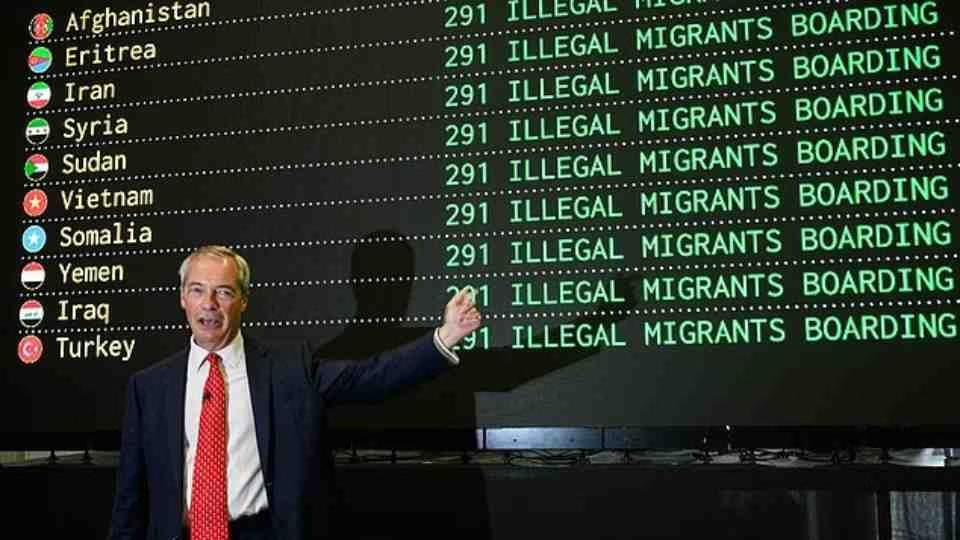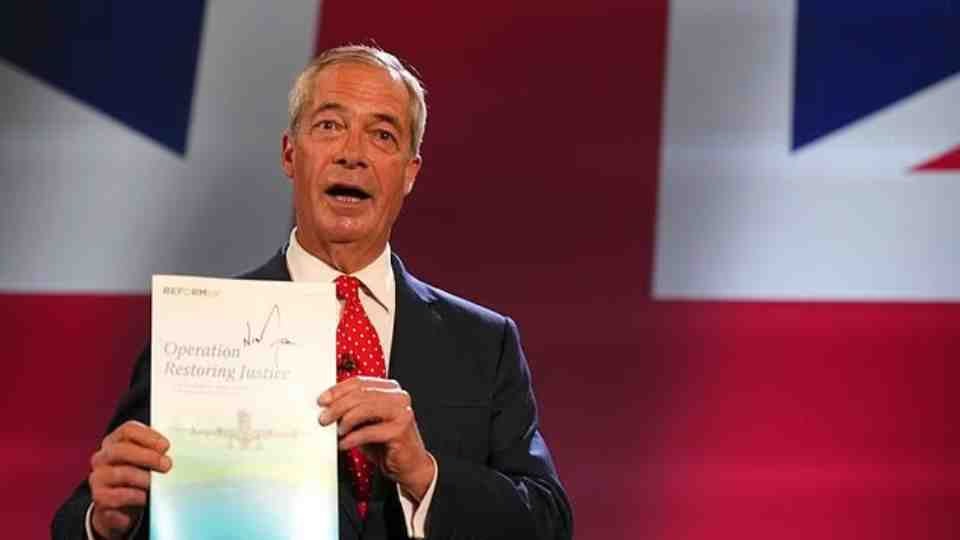Reform UK leader Nigel Farage has presented an ambitious immigration enforcement proposal called Operation Restoring Justice, designed to fundamentally reshape Britain’s approach to illegal immigration through mass deportations and detention.
The Core Policy Framework
The centerpiece of Reform’s immigration strategy involves declaring anyone entering Britain through unauthorized channels—including small boat crossings and lorry stowaways—as ineligible for asylum protection. This blanket ban would extend beyond new arrivals to encompass individuals already residing illegally within the UK.
Reform projects this initiative would require £10 billion in funding over five years while ultimately delivering £42 billion in taxpayer savings across a decade through the closure of asylum accommodation facilities.

Detention Infrastructure Expansion
Under the proposed system, all unauthorized arrivals would face mandatory detention pending deportation, representing a dramatic departure from current practices that typically house migrants in hotels or rental properties. The party envisions expanding detention capacity from the current 2,000 beds across seven facilities to accommodate 24,000 individuals within 18 months.
This expansion would necessitate constructing new Secure Immigration Removal Centres in remote locations, budgeted at £2 billion over five years. These facilities would house men, women, and children under basic but non-punitive conditions with security measures preventing escapes.
However, Reform has declined to identify specific locations for these centers, citing concerns about government land acquisition. Historical precedent suggests significant challenges, as previous Conservative attempts at large-scale detention facilities largely failed, wasting approximately £100 million according to parliamentary reports.
Deportation Operations
The logistics of Reform’s deportation strategy involve operating five charter flights daily, with the Royal Air Force maintaining a standby Voyager aircraft for operational continuity. The party allocates £1.5 billion over the parliamentary term for flights, security escorts, and logistical support.
Senior Reform figure Zia Yusuf has indicated plans to deport up to 288,000 individuals annually, requiring over 150 passengers per flight across 365 operational days. Former Border Force officials question the feasibility of sourcing sufficient commercial aircraft, suggesting military alternatives would need adaptation for passenger capacity.
International Agreements and Third Country Arrangements
Reform’s approach diverges significantly from traditional UK policy by proposing deportations to any global destination, regardless of human rights concerns. The party cites Germany’s recent deportations to Taliban-controlled Afghanistan as precedent and expresses willingness to negotiate with regimes including Iran and Eritrea.
The Foreign Office would prioritize securing return agreements using incentive-based diplomacy, offering increased aid to cooperative nations while imposing visa restrictions and potential sanctions on non-compliant countries. Reform has allocated £2 billion over five years for these diplomatic initiatives.
The party also seeks to revive the Rwanda deportation scheme and establish new agreements with Albania, despite that country’s stated reluctance to accept non-citizens. British Overseas Territories, particularly Ascension Island, represent potential alternatives, though previous estimates suggested costs of £1 million per deportee due to required infrastructure development.

Domestic Enforcement Operations
Reform proposes extensive raids to identify and detain illegal residents through a new Illegal Migrant Identification Centre within a proposed UK Deportation Command. This would involve enhanced data sharing between government agencies including the NHS, tax authorities, and vehicle licensing to locate unauthorized residents.
The policy includes mandatory biometric capture during all police encounters and expanded search warrant coverage beyond single properties. While the Home Office currently conducts enforcement actions—recently arresting 280 suspected illegal workers in food delivery—Reform’s approach would significantly scale these operations.
Voluntary Departure Incentives
Alongside enforcement measures, Reform would offer a six-month voluntary return period before implementing large-scale raids. Participants would receive £2,500 payments plus transportation costs, facilitated through a dedicated smartphone application.
While the Home Office already operates voluntary return programs—facilitating nearly 12,000 departures in 2024—Reform seeks to maximize voluntary participation due to lower costs compared to forced detention and deportation.
Legal Framework Modifications
Reform’s most controversial proposal involves withdrawing from key international agreements that could challenge its policies in court. The party would disapply the 1951 Refugee Convention, UN Convention Against Torture, and Council of Europe Anti-Trafficking Convention to prevent judicial intervention.
Additionally, Reform would repeal the Human Rights Act and withdraw from the European Convention on Human Rights, citing these as obstacles to deportation enforcement due to family life protections.
Legal and Practical Challenges
Despite these proposed changes, legal experts indicate that fundamental common law protections would remain intact. English law provides habeas corpus rights for contesting unlawful detention and judicial review procedures for examining government decisions.
Human rights barrister Shoaib M. Khan notes that comprehensive judicial review challenges could potentially halt the entire deportation scheme, particularly through policy-wide challenges that address systematic removal programs rather than individual cases.
The House of Lords would likely challenge these reforms, though legal experts acknowledge that sufficient parliamentary backing could enable repeal of domestic human rights legislation.
Implementation Concerns
Migration experts question several practical aspects of Reform’s proposals. Securing international cooperation for deportation agreements remains challenging, particularly when migrants lack documentation or their countries of origin refuse to issue replacement papers.
The scale of proposed operations—involving massive detention facilities, daily charter flights, and comprehensive enforcement raids—represents an unprecedented expansion of immigration enforcement capabilities that would require substantial logistical coordination and financial resources.
Public reception of agreements with regimes like the Taliban could damage Britain’s international reputation and potentially jeopardize existing cooperative arrangements with allies such as France, according to Oxford University’s Migration Observatory.
Reform’s Operation Restoring Justice represents perhaps the most comprehensive immigration enforcement proposal in recent British political history, combining expanded detention, mass deportation, international negotiations, and significant legal framework changes into a single policy package designed to address unauthorized immigration through deterrence and removal.






